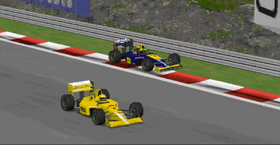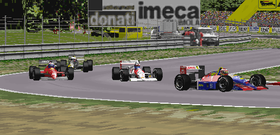Isabella Noriko
Isabella Noriko (born 4th August 1964 in Novena, Singapore) is a Singaporean driver of Italian descent who would be the first driver in Formula One to compete from Singapore as she competed for Larrousse Calmels in the 1988 Formula One season. She would remain with the Larrousse team for the entirety of her career in F1, initially due to her Singaporean backing but was retained by the team for her development input. Along with Maria Teresa di Filippis and Lella Lombardi Noriko is one of the few women to have scored points in Formula 1, having scored her first points at the 1990 United States Grand Prix with a 5th place finish.
Early life
Born to a Japanese bussinessman who emigrated in the late 1950s to Singapore, and to a Italian mother, Noriko's early life was mostly spent in Japan, where she had a high class education and was known for acting in a strict manner, having no sense of humour, being stubborn and always aiming at being the best. She learned Japanese, German, Spanish, Italian, Mandarin and English. She later became a Engineering graduate at the Tokyo University of Science.
Japanese racing (1984-86)
Her father later invited her and her mother to a racing event at Suzuka, the 1000km of 1984, due to a sponsor meeting. She was taken away by the racing, and asked her father to fund a few sportscar events, which while initially relunctant to, he accepted. Despite her inexperience with the machinery, he won some of these events, and eventually started to rise up in the Japanese racing scene.
In 1985, after she finished her graduate, she started to become interested in open-wheeler racing, and decided to give the Japanese Formula 2 a go. She in her first year was seen as a mediocre driver, but she did shine a few times, most notably, when she won the RRC Fuji F2 Champions race after a heated battle between Kenneth Acheson, Masahiro Hasemi, Keinji Takahashi and herself. In 1986 however, she improved this further. She challenged the title after some setbacks (most notably, a rather hard crash caused by Hideshi Matsuda which forced her to stay out a round). She then went onto score three grand chelems, and in the finale, was close to winning the title, if it wasn't for a faulty tyre in the pitlane. Even though she had the same points as Satoru Nakajima, Nakajima won on counter of having more points without the dropped ones. Despite this, she wasn't moved by this one bit and continued on.
CART (1987)
After her 1986 season, she took a trip back to Singapore. With the growing economy, many state companies supported her, in no small part thanks to conviction of his father of course. She then managed to land a seat at Galles Racing. In her CART stint, she surprised everyone by being Rookie of the Year in the Indy 500, and then in the championship, by finishing 7th overall. Her driving style, very safe on her tyres, was key in CART, and she was able to score some amazing points, which included that 5th place in the Indy 500. She amazed even more by scoring two 2nd places and a 3rd place in the finale.
F1 - Larrousse (1988-)

With Larrousse's opening of seats after Alliot and Matarazzo's contract release, Noriko thought of making a jump to Formula One. She bringed with her much needed money for Larrousse thanks to her Singaporean backing. Despite attempts from both Larrousse and Ichiro at trying to lobby Zakspeed, they weren't able to get their engines, and had to settle for the Ford DFRs. Her teammate for the first half of the season would be Aguri Suzuki, a fellow Japanese driver who was thought of as more talented thanks to his experience in Europe. However, this would be proven wrong, as Suzuki, apart from a 9th place obtained at Monaco thanks to a rookie mistake by Noriko, proved to be vastly inferior in both talent and experience. He did not even qualify three times, and he seemed completely clueless in this new racing enviroment. Noriko, while not entirely used to F1, proved to be far more adapt a lot more times, if a bit unlucky with reliability issues. She saw this season as mostly getting used to F1, and tried her best. With Aguri Suzuki getting replaced by Harvey Jones mid-season, Noriko and Jones did a lot of cooperation, with Noriko's more technical edge providing a backbone for Jones' raw talent. She ended up 24th in the standings, with 0 points.
1989 proved to be a vastly better season. Ichiro had conviced Lamborghini, who had settled on Larrousse for works engine supply, to give Noriko semi-official backing, something that would help Noriko immensely. The Jones/Noriko pair was renewed for another year, with the lot continuing their technical cooperation; Jones was on his last year, and sought to transfer a lot of his knowlodge onto Noriko. The season at first was hard, due to frustrations with the new V12 engine, but after Canada, she started to gain a lot more, culminating in her knowing the 3512 from start to finish, helped thanks to her partnership with Lambo. Despite not finishing with points (coming close two times at Bikernieki and Estoril) she saw a massive progress in her technical knowlodge and driving skills.
After racing
After racing, Noriko returned to Singapore and became a very sucessful bussinesswoman, and was one of the main investors in the Singaporean Grand Prix.
Personal Life
Noriko's father, Ichirō (born 1912, died 2004), came from a very sucessful merchant family, and fervently supported the Japanese war effort. Her mother, Ilse Ciampac (born 1925), was an Austrian-Italian who her family emigrated during WW1.
She practices Shintoism.
She has residences in Singapore, Japan, and Hong Kong.
Results
Complete Japanese Formula Two results
(Races in bold indicate pole position)
| Year | Entrant | 1 | 2 | 3 | 4 | 5 | 6 | 7 | 8 | DC | Points |
|---|---|---|---|---|---|---|---|---|---|---|---|
| 1985 | Advan Team Nova | SUZ 4 |
FUJ 4 |
MIN 4 |
SUZ 4 |
SUZ Ret |
FUJ 1 |
SUZ 7 |
SUZ 6 |
4th | 64 (70) |
| 1986 | Marlboro Team Nova | SUZ 4 |
FUJ 3 |
MIN Ret |
SUZ INJ |
SUZ 1 |
FUJ 1 |
SUZ 1 |
SUZ 4 |
2nd | 92 |
American Open-Wheel racing results
CART
| Year | Team | 1 | 2 | 3 | 4 | 5 | 6 | 7 | 8 | 9 | 10 | 11 | 12 | 13 | 14 | 15 | Rank | Points |
|---|---|---|---|---|---|---|---|---|---|---|---|---|---|---|---|---|---|---|
| 1987 | Galles Sport | PHX 16 |
LBH 8 |
INDY 5 |
MIL 12 |
POR 9 |
MEA 4 |
CLE 22 |
TOR DNS |
MIC 8 |
POC 2 |
ROA 2 |
MDO 7 |
NAZ 12 |
LAG 5 |
MIA 3 |
7th | 100 |
Formula One
| Year | Entrant | Chassis | Engine | 1 | 2 | 3 | 4 | 5 | 6 | 7 | 8 | 9 | 10 | 11 | 12 | 13 | 14 | 15 | 16 | 17 | WDC | Points |
|---|---|---|---|---|---|---|---|---|---|---|---|---|---|---|---|---|---|---|---|---|---|---|
| 1988 | Larrousse Calmels | Lola LC88 | Ford Cosworth DFZ 3.5 V8 | BRA Ret |
SMR Ret |
MON 10 |
MEX 11 |
CAN Ret |
DET 17 |
FRA Ret |
GBR Ret |
GER Ret |
HUN Ret |
YUG DNQ |
SOV 16 |
ITA 17 |
BEL 17 |
JAP 17 |
AUS 16 |
NC | 0 | |
| 1989 | Larrousse Calmels | Lola LC89 | Lamborghini LE-3512 3.5 V12 | BRA Ret |
SMR Ret |
MON DNPQ |
FRA DNPQ |
USA DNQ |
CAN Ret |
GBR 12 |
GER 11 |
HUN DNQ |
SOV 7 |
POR Ret |
ITA 12 |
BEL 13 |
JAP 15 |
AUS Ret |
MEX DNQ |
NC | 0 | |
| 1990 | ESPO Larrousse F1 | Lola LC90 | Lamborghini LE-3512 3.5 V12 | USA 5 |
BRA | PAC | SMR | MON | CAN | MEX | FRA | GBR | GER | HUN | SOV C |
BEL | ITA | POR | JPN | AUS | 2 | 5th |
